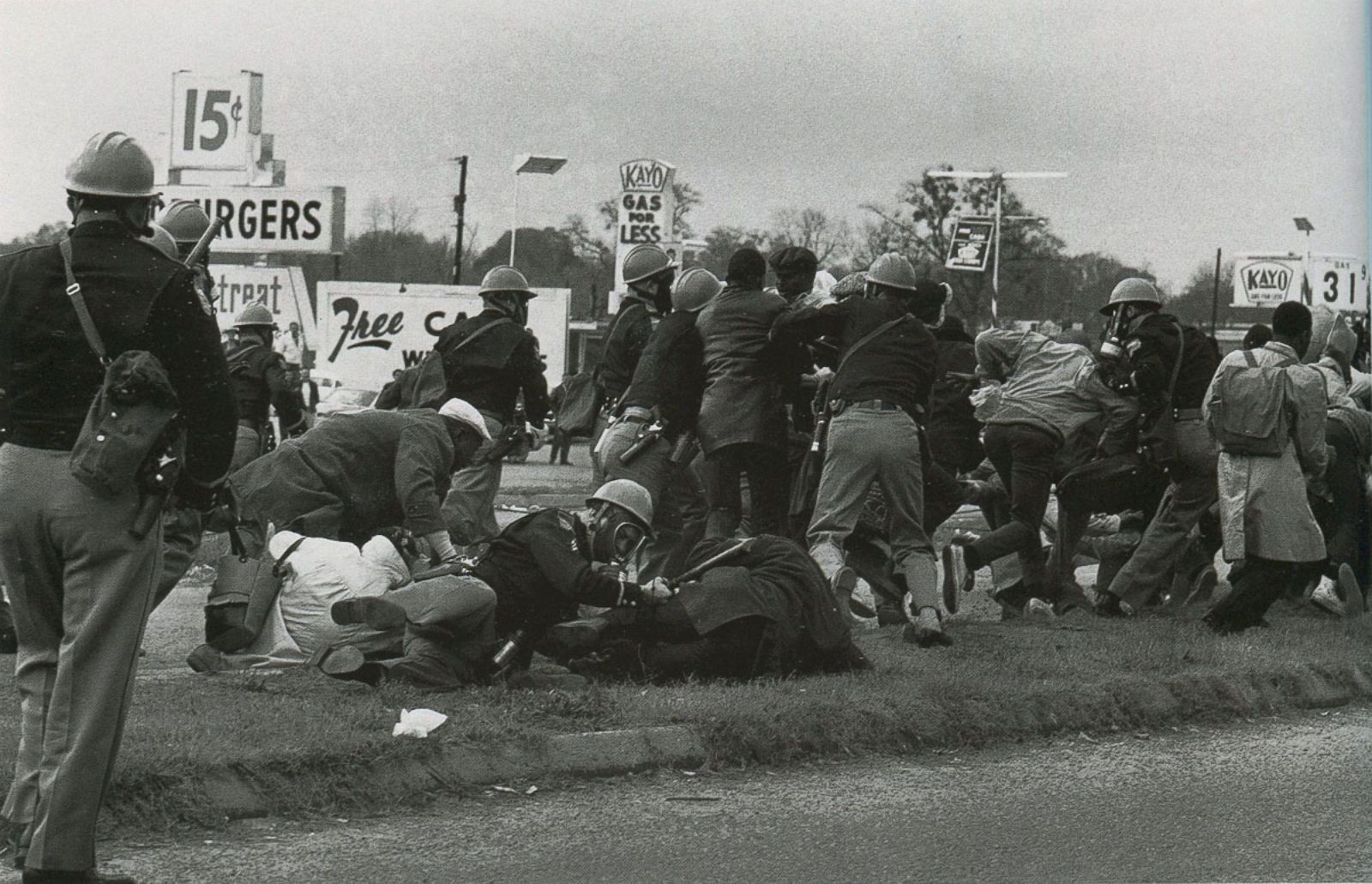On March 20, 1965, President Lyndon B. Johnson notifies
Alabama’s Governor George Wallace that he will use federal authority to call up
the Alabama National Guard in order to supervise a planned civil rights march from Selma to Montgomery.
Intimidation and discrimination had
earlier prevented Selma’s Black population—over half the city—from registering
and voting. On Sunday, March 7, 1965, a group of 600 demonstrators marched on Selma to protest
this disenfranchisement and the earlier killing of a Black man, Jimmie Lee
Jackson, by a state trooper.
In brutal scenes that were later
broadcast on television, state and local police attacked the marchers with Billy
clubs and tear gas. TV viewers far and wide were outraged by the images, and a
protest march was organized just two days after “Bloody Sunday” by Martin Luther King Jr., head of the Southern Christian Leadership Conference
(SCLC). King turned the marchers around, however, rather than carry out the
march without federal judicial approval.
After an Alabama federal judge ruled
on March 18 that a third march could go ahead, President Johnson and his
advisers worked quickly to find a way to ensure the safety of King and his
demonstrators on their way from Selma to Montgomery. The most powerful obstacle
in their way was Governor Wallace, an outspoken segregationist who was
reluctant to spend any state funds on protecting the demonstrators. Hours after
promising Johnson—in telephone calls recorded by the White House—that he would
call out the Alabama National Guard to maintain order, Wallace went on
television and demanded that Johnson send in
federal troops instead.
Arriving safely in Montgomery on March
25, they watched King deliver his famous “How Long, Not Long” speech from the
steps of the Capitol building. The clash between Johnson and Wallace—and
Johnson’s decisive action—was an important turning point in the civil rights
movement. Within five months, Congress had passed the Voting Rights Act,
which Johnson proudly signed into law on August 6, 1965.
https://www.history.com/this-day-in-history
I’ve written about this topic before, and it’s instructive so
see how much, and how little, has changed since that time.
https://tohell-andback.blogspot.com/2017/03/
Here’s a few excerpts from the article listed about, as well
as my comments, underlined and italicized, that compares the present day to
that article:
A strong part of the reason
that Johnson felt compelled to address the issue was the fact that the events
in Selma were captured on film by news agencies, causing outrage throughout the
country. The movie “Selma” (which not enough people have seen) graphically
illustrates the racial injustice
that still persisted in his country 97 years after the passage of the 14th Amendment. If you have not seen the movie,
you can see it in its entirety on several sites, but you can also watch a
shorter version that captured the violence of the day:
Sharon and I saw “Selma” in Flagstaff, despite the
fact that it had limited viewing times. That same weekend, “American Sniper”
and “Hot Tub Time Machine” attracted larger audiences – and more viewing times.
The final box domestic office receipts for “Selma”
were $52 million.
https://www.boxofficemojo.com/release/rl1936623105/
In contrast, the domestic box office receipts for “American
Sniper” were $350 million, and “Hot Tub Time Machine” took in $50,000,000.
https://www.boxofficemojo.com/release/rl2923660801/
https://www.boxofficemojo.com/release/rl2136507905/
As a result of legislation
written by the American Legislative Exchange Council, states started to pass
more restrictive voting laws in 2010, and the Supreme Court ruling of June 25,
2013 (Shelby County V. Holder) further weakened the Voting Rights Act. As a
result, the 2016 Presidential election was the first one that was held after
the Supreme Court ruling – with disastrous results. 98 of the 100 largest
newspapers printed editorials in the fall that Donald Trump was not fit to be
President. In the end, Hillary Clinton received endorsements from 57
newspapers, and Trump only received endorsements from 2. Thirty five of the 98
newspapers either did not endorse any one at all, or they endorsed either Gary
Johnson or Jill Stein.
https://www.brennancenter.org/our-work/court-cases/shelby-county-v-holder
Since the election of 2020, nineteen states have passed 33 news laws
that makei harder to vote, according to an updated analysis by the liberal Brennan Center
for Justice
https://www.cnn.com/2021/10/04/politics/voting-laws-restrictive-map-october/index.html
One of the people injured in Selma in 1965 was the late John Lewis, who suffered a skull fracture on that day. Ultimately, he was elected to Congress, and represented 5th Congressional District from 1987 until his death in 2020.
https://en.wikipedia.org/wiki/John_Lewis_Voting_Rights_Acty,
Congress tried to pass a new Voting Rights bill (the
John R. Lewis Voting Act) in 2022, but Republican opposition killed the bill.
As a result, restrictive voting laws in Texas have caused at least 16,800
mail-in ballots to be rejected due to new restrictive voting laws.
https://www.cbsnews.com/news/texas-rejected-at-least-16800-mail-ballots-in-primary-elections/
https://en.wikipedia.org/wiki/John_Lewis_Voting_Rights_Act
Winston Churchill once said, “Democracy is the worst form of
government – except for all the other types of government”.
In a democracy, progress on some issues can sometimes be agonizingly
slow, and it is still possible that the John Lewis Voting Rights Act could be passed – but it all depends on the results of the 2020 mid-term elections.
During the reign of king Richard I in Chicago (Richard J. Daley),
the preferred method of voting was to “vote early, and vote often”. Today, of
course, that illegal practice would not stand scrutiny, but is DOES reinforce
that fact that voter participation is still our only hope of having society function
properly.

No comments:
Post a Comment